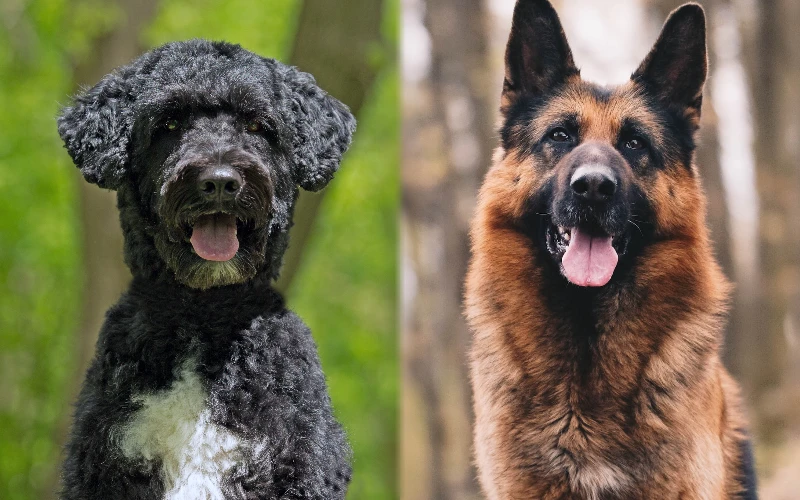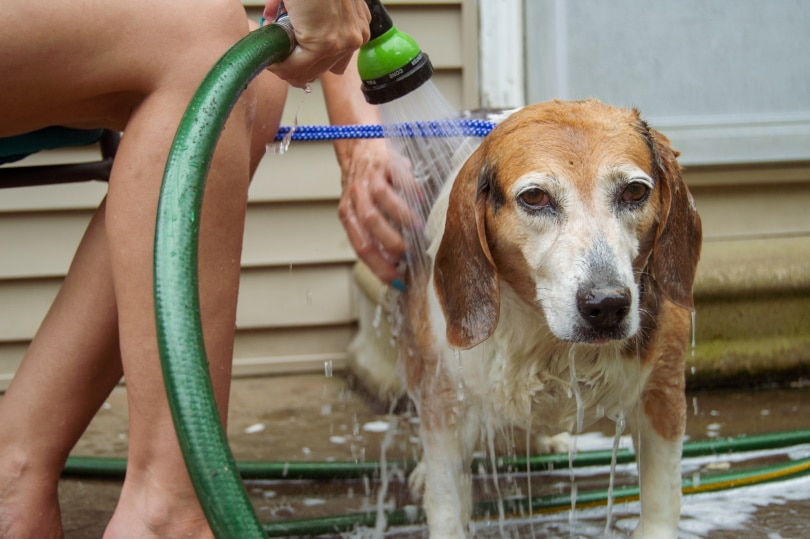Portuguese Water Dog German Shepherd Mix: Pictures, Info, Care Guide & More
By Kit Copson
Updated on

In the vast world of mixed-breed dogs, there are both well-known mixes, like the Labradoodle and Cockapoo, and far lesser-known mixes, like the Portuguese Water Dog German Shepherd Mix (PWD-GSD mix).
Though not so common, this is a truly wonderful match, since both the Portuguese Water Dog and German Shepherd have some really lovely traits, both temperament-wise and appearance-wise. In this post, we share all you need to know about the Portuguese Water Dog German Shepherd mix.
| Height: | 17–26 inches |
| Weight: | 35–90 pounds |
| Lifespan: | 10–14 years |
| Colors: | Black, brown, white, blue, liver, sable, gray, black & red/cream/silver/tan, bi-color |
| Suitable for: | Anyone committed to proper care, training, exercise, and socialization |
| Temperament: | Varies, but likely active, energetic, affectionate, intelligent, alert, and hardworking |
With mixed breeds, it’s difficult to predict exactly what the dog will look like, because various traits are possible. For example, though there are only three Portuguese Water Dog colors, there is a large number of coat color possibilities for German Shepherds. Likewise, while the Portuguese Water Dog’s coat is wavy or curly and long, the German Shepherd’s is medium-length and has an undercoat.
Due to this diversity of physical characteristics, a Portuguese Water Dog German Shepherd Mix could have traits more like one of the two parent breeds or a clear mix of both.
The Portuguese Water Dog is smaller at between 17 and 23 inches, whereas the German Shepherd is between 22 and 26 inches tall. On this basis (weight included), the Portuguese Water Dog German Shepherd mix can grow up to 26 inches tall and weigh up to 90 pounds.
Portuguese Water Dog German Shepherd Mix Characteristics
Portuguese Water Dog German Shepherd Puppies

If you plan to get a Portuguese Water Dog German Shepherd mix from a breeder, your best bet would be to reach out to a breeder that produces Portuguese Water Dog or German Shepherd mixes. From our research, it seems that mixes of these breeds typically cost anywhere between $300 and $1,500, but Portuguese Water Dog German Shepherd mixes specifically are not very easy to find.
Alternatively, you can look into Portuguese Water Dogs, German Shepherds, or mixes of these breeds that are up for adoption. We found a Portuguese Water Dog German Shepherd mix on a US rescue organization’s website, so it’s certainly possible to adopt one, even though these dogs aren’t that common.
Even if you don’t find this mix specifically for adoption, you’ll no doubt be spoiled for choice by all the lovely other mixes out there. Some shelters and organizations are even dedicated entirely to specific breeds or breed mixes. For example, we found sites dedicated to both Portuguese Water Dog rescues and German Shepherd rescues, so have a look around and you may just find a very special blend of both!
If you decide to go with a breeder, choose very carefully, and only go to one that’s reputable, screens for health conditions, and cares about the welfare of the dogs. As puppies, Portuguese Water Dog German Shepherd mixes are likely to be very lively and playful. It’s best to start socializing and training them as early as possible.

Temperament & Intelligence of the Portuguese Water Dog German Shepherd Mix 🧠
A well-socialized Portuguese Water Dog German Shepherd mix could have inherited any number of wonderful personality traits from their parents, but it’s hard to predict exactly what the personality will be like. While German Shepherds are known for being steady and dignified, Portuguese Water Dogs are often enthusiastic adventurers.
On this basis, you could get a Portuguese Water Dog German Shepherd mix with stronger Portuguese Water Dog traits or stronger German Shepherd traits, or a combination of both. Traits these breeds have in common are an affectionate nature, high energy levels, alertness, and high intelligence, but socialization is crucial for making sure these positive traits truly shine through.
Are These Dogs Good for Families? 👪
This mix combines the unshakeable loyalty and protectiveness of the German Shepherd with the eager-to-please, enthusiastic Portuguese Water Dog personality, which makes a well-socialized Portuguese Water Dog German Shepherd mix an excellent family dog. Both parent breeds are known for being gentle with children.
Outside the family unit, your Portuguese Water Dog German Shepherd mix may be either bubbly and friendly with strangers like the Portuguese Water Dog, or a little more guarded like the German Shepherd.
Does This Breed Get Along with Other Pets?
Yes, if you socialize your Portuguese Water Dog German Shepherd mix properly and gradually with other pets from a young age. If you adopt one of these dogs, you can find out how well they tend to get along with other animals from the shelter or rescue organization.

Things to Know When Owning a Portuguese Water Dog German Shepherd Mix:
Food & Diet Requirements 🦴
Dogs are omnivores and require a diet made up of a blend of proteins, carbohydrates, vitamins, minerals, fats, and water. Any formula you choose should be balanced and complete—this should be indicated on the packaging.
Your Portuguese Water Dog German Shepherd mix should be fed a high-quality, age-appropriate formula, in some cases tailored to specific areas of health (weight management, joint health, etc.) depending on their needs. If you get a size-specific formula, you’ll want to check the label to make sure it’s appropriate for their size and weight.
Exercise 🐕
The Portuguese Water Dog German Shepherd mix descends from two very energetic, active breeds, so prepare to dedicate anywhere from 1–2 hours every day to physical exercise. There are various ways that you can channel energetic dogs’ energy, including a staple two or three walks per day, playing interactive games, obedience training, and agility training.
If a dog with high energy levels, like a Portuguese Water Dog German Shepherd mix, isn’t sufficiently exercised, they may turn to destructive behaviors, so daily exercise is one of the biggest commitments when it comes to parenting this kind of canine.
Training 🎾
Both parent breeds typically do well with obedience training, since they’re highly intelligent, eager to please, and love having a job to do. Consistent training sessions with a determined and patient leader are what these dogs need, especially given their size.
Though it’s crucial to train any dog even if they’re tiny, larger and stronger dogs can become especially difficult to manage if they aren’t given healthy boundaries. For this reason, it’s always a good idea to enroll your Portuguese Water Dog German Shepherd mix in obedience classes. Obedience and socialization classes offer a great foundation for the training you’ll do at home on a daily basis.

Grooming ✂️
This is a tricky one since the German Shepherd and Portuguese Water Dog have very different coat types. The Portuguese Water Dog has a low-shedding, “hypoallergenic” coat, whereas the German Shepherd has a double coat, which means they shed somewhat year-round, but when shedding season rolls around, they shed a lot more than usual.
Due to this, the mixed dog’s coat could be either more similar to the German Shepherd’s or more similar to the Portuguese Water Dogs. It could also be a bit of both. If your mix has a coat more like the German Shepherd’s, you may have to whip out a deshedding tool during shedding seasons to control the mass of hair they’ll shed. At other times, their coat will need to be brushed every other day.
If the coat is more like the Portuguese Water Dogs, they won’t shed as much, but will still need to be brushed every day or at least every second day to keep their wavy/curly coat in good shape and tangle-free. They’ll also likely need a bath every month or every couple of months to help get rid of any buildup. Consider having this kind of coat clipped regularly by a professional groomer.
In addition to caring for the coat, you’ll need to trim your dog’s nails regularly to prevent overgrowth and check their ears often for dirt and debris, cleaning them if necessary with a pet-safe solution.
Health and Conditions ❤️
Portuguese Water Dog German Shepherd mixes, like all dogs, could potentially develop a health condition at some point in their life, and it’s always a good idea to be vigilant for any changes in your dog that may indicate a health issue.
Though it’s not known if this mix is at risk of any specific health conditions, we can take a look at health conditions that sometimes affect the parent breeds to get an idea of potential issues that could affect the Portuguese Water Dog German Shepherd Mix (please see below).
If you buy from a breeder, only buy from one that offers health screening and health guarantees for their puppies. If you adopt, speak to the shelter about the dog’s health history.
- Mild allergies
- Minor stomach upset
- Hip and elbow dysplasia
- Degenerative myelopathy
- Bloat
- Exocrine pancreatic insufficiency
- Epilepsy
 Male vs Female
Male vs Female
There are no significant differences between male and female Portuguese Water Dog German Shepherd mixes in terms of appearance or personality. Males are likely to be a bit bigger and heavier than females, but the personality really depends on the individual dog, not the gender.
If your unspayed female dog is in heat, she may become more restless, irritable, lethargic, and/or clingy than usual. She may also attempt to roam, pee more often, and experience appetite changes. Unneutered male dogs that sense a female in heat may become more territorial, aggressive toward other males, and likely to mount, roam, and/or urine mark.
3 Little-Known Facts About the Portuguese Water Dog German Shepherd Mix
1. Portuguese Water Dogs Were Bred as Fishing Dogs
Originating in Portugal, the Portuguese Water Dog was once commonly used to herd fish and fetch lost tackle. They were also used to deliver messages from ships to those on the shore. Thanks to their special skills, Portuguese Water Dogs are still sometimes employed as water rescue and recovery dogs.
2. Canine Movie Stars Helped Popularize the German Shepherd
German Shepherds were first developed in Germany as herding dogs in the 19th century, but they only started to become popular in the US in the 20th century. German Shepherd stars of the screen, Rin Tin Tin and Stongheart, helped bring the breed into the public eye.
3. Both the Portuguese Water Dog & German Shepherd Are Popular in the US
The German Shepherd is the fourth most popular dog in the US at present, as per the AKC’s breed ranking. The Portuguese Water Dog is further down the list at number 46 out of 284, but this nevertheless shows that the breed is among the most popular in the country.

Final Thoughts
Though not much is known about the Portuguese Water Dog German Shepherd mix due to it being fairly uncommon, one thing’s for sure—this is a fantastic and seriously cute mix.
If you would like a Portuguese Water Dog German Shepherd mix or a similar mix, we’d urge you to check out the websites or social media pages of shelters and rescue organizations in your area, as you might be lucky enough to find exactly who you’re looking for, or, if not, another mix that’s paw-fect for you.
See Also:
- Portuguese Water Dog Husky Mix: Pictures, Info, Care Guide & More
- Golden Retriever Portuguese Water Dog Mix: Pictures, Info, Care Guide & More
Featured Image Credit: Left – Jennay Hitesman, Shutterstock | Right – Anna Dudkova, Unsplash



 Male vs Female
Male vs Female








